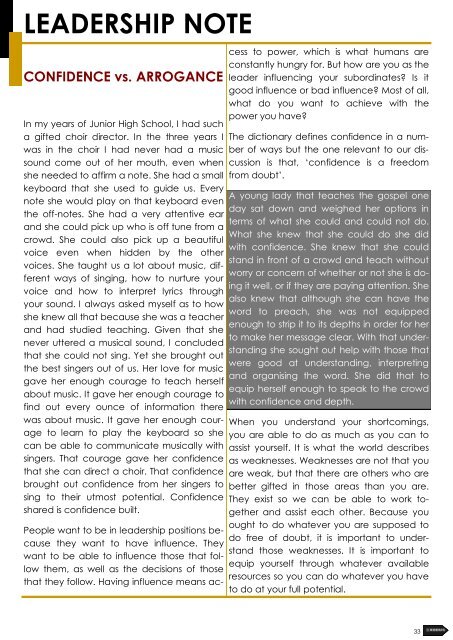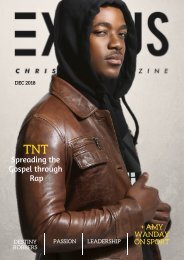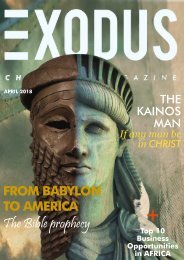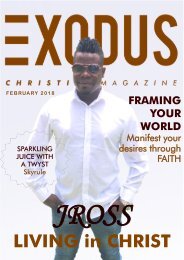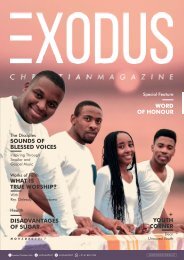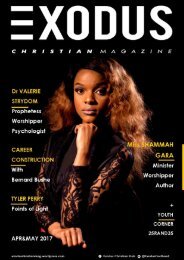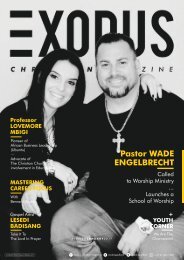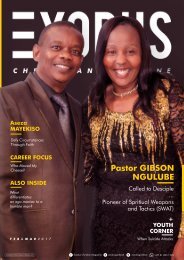ExodusMagSep2017
Create successful ePaper yourself
Turn your PDF publications into a flip-book with our unique Google optimized e-Paper software.
LEADERSHIP NOTE<br />
CONFIDENCE vs. ARROGANCE<br />
In my years of Junior High School, I had such<br />
a gifted choir director. In the three years I<br />
was in the choir I had never had a music<br />
sound come out of her mouth, even when<br />
she needed to affirm a note. She had a small<br />
keyboard that she used to guide us. Every<br />
note she would play on that keyboard even<br />
the off-notes. She had a very attentive ear<br />
and she could pick up who is off tune from a<br />
crowd. She could also pick up a beautiful<br />
voice even when hidden by the other<br />
voices. She taught us a lot about music, different<br />
ways of singing, how to nurture your<br />
voice and how to interpret lyrics through<br />
your sound. I always asked myself as to how<br />
she knew all that because she was a teacher<br />
and had studied teaching. Given that she<br />
never uttered a musical sound, I concluded<br />
that she could not sing. Yet she brought out<br />
the best singers out of us. Her love for music<br />
gave her enough courage to teach herself<br />
about music. It gave her enough courage to<br />
find out every ounce of information there<br />
was about music. It gave her enough courage<br />
to learn to play the keyboard so she<br />
can be able to communicate musically with<br />
singers. That courage gave her confidence<br />
that she can direct a choir. That confidence<br />
brought out confidence from her singers to<br />
sing to their utmost potential. Confidence<br />
shared is confidence built.<br />
People want to be in leadership positions because<br />
they want to have influence. They<br />
want to be able to influence those that follow<br />
them, as well as the decisions of those<br />
that they follow. Having influence means access<br />
to power, which is what humans are<br />
constantly hungry for. But how are you as the<br />
leader influencing your subordinates? Is it<br />
good influence or bad influence? Most of all,<br />
what do you want to achieve with the<br />
power you have?<br />
The dictionary defines confidence in a number<br />
of ways but the one relevant to our discussion<br />
is that, ‘confidence is a freedom<br />
from doubt’.<br />
A young lady that teaches the gospel one<br />
day sat down and weighed her options in<br />
terms of what she could and could not do.<br />
What she knew that she could do she did<br />
with confidence. She knew that she could<br />
stand in front of a crowd and teach without<br />
worry or concern of whether or not she is doing<br />
it well, or if they are paying attention. She<br />
also knew that although she can have the<br />
word to preach, she was not equipped<br />
enough to strip it to its depths in order for her<br />
to make her message clear. With that understanding<br />
she sought out help with those that<br />
were good at understanding, interpreting<br />
and organising the word. She did that to<br />
equip herself enough to speak to the crowd<br />
with confidence and depth.<br />
When you understand your shortcomings,<br />
you are able to do as much as you can to<br />
assist yourself. It is what the world describes<br />
as weaknesses. Weaknesses are not that you<br />
are weak, but that there are others who are<br />
better gifted in those areas than you are.<br />
They exist so we can be able to work together<br />
and assist each other. Because you<br />
ought to do whatever you are supposed to<br />
do free of doubt, it is important to understand<br />
those weaknesses. It is important to<br />
equip yourself through whatever available<br />
resources so you can do whatever you have<br />
to do at your full potential.<br />
33


